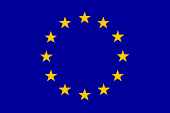SPARC Europe/LIBER Joint Workshop on the FOSTER and PASTEUR4OA Projects
SPARC Europe/LIBER Joint Workshop ‘Open Access Policy for Europe: the Implications for European Research Libraries’
Beginning of July, the annual LIBER conference took place in Riga, Latvia. Approximately 350 delegates, many of them representing LIBER members, were in attendance for three days of talks, workshops, networking and events in the amazing setting of the newly opened National Library of Latvia. In collaboration with SPARC-Europe, LIBER hosted a pre-conference workshop to introduce two of our current projects, PASTEUR4OA and FOSTER; we also discussed the funding opportunities offered to librarians and library managers by Horizon 2020, the EU’s research and innovation programme.

Photo Credit: Dan North CC-BY
Dan North helped to organize this 3-hour session with SPARC-Europe’s Alma Swan. After a short introduction, during which we outlined the key points of Horizon 2020 (such as the most relevant funding calls for LIBER members) and the aims/objectives of the two projects, we arranged discussions in café-style, with a different expert at each table, and the chance for delegates to ask questions and engage in discussion with other professionals from a range of fields and national contexts. Our hope was that this would be a much more interactive and productive approach than if we had delivered a series of talks from the front of the room.
Both projects are in their early stages (following their dual kick-off meetings in February), and both of them looking to build communities of interested, informed stakeholders; both projects are essentially aiming to improve knowledge of, and access to, information about Open Access and Open Science practices across academic disciplines.
PASTEUR4OA is working upstream and mapping the current terrain of OA policies across and within European member states in order to facilitate matched policies in the EU: in a more unified, open and international research community, we can improve access to information for professional researchers.
FOSTER, on the other hand, is a downstream initiative that is developing training for, in particular new and early-career researchers, to help them to embed good Open Science practice in their daily workflow: there has been a tendency to think of open data, for instance, as something to do at the end of the research process, after publication, but in order to promote the values of Open Science and make it easier to implement, we want it to become a natural part of how scholars go about their regular business.
FOSTER has three main outputs to achieve:
1. identifying and consolidating existing content that can be re-used in future training activities (if you know of any content that fits this description, please let us know via this web-form);
2. creating the online FOSTER portal to host repackaged contents and training materials;
3. delivering face-to-face training. With the exception of the portal, two of these require participation and feedback from research communities so that FOSTER can respond to the needs of the people who will ultimately be charged with continuing to disseminate the skills and knowledge generated by the project.
This workshop sought to explain the roles that librarians, library/data managers can play in mediating the sometimes complicated world of Open Data and Open Access in their everyday interactions with researchers. We ran three separate cycles of discussions: after 30 minutes, everybody could move to another table for a different topic. We found that, although it was a good opportunity for us to introduce and raise awareness of the projects, and how Horizon 2020 might shape the requirements for research funding in the next decade, it was also a wonderful chance to hear from dozens of librarians from all over Europe. Their experiences are extremely diverse, and it will be crucial to the success of these projects in the next two years that we learn from and respond to those experiences.
We felt that the workshop was a great success, and hope that it will set the tone for similar forthcoming events. FOSTER will be supporting a calendar of training events and workshops over the rest of this year. Keep an eye on this website for further updates. In October, we will release a new call for proposals to host a second round of events in 2015. If you think you or anyone at your institution would like to learn more about attending or hosting one of these events, please don’t hesitate to contact FOSTER directly. If you attended the workshop, and would like to provide any additional feedback about it or comment on anything you took away from the table discussions email dan.north@kb.nl.
 Unless otherwise stated, all materials created by the FOSTER consortium are licensed under a CREATIVE COMMONS
ATTRIBUTION 4.0 INTERNATIONAL LICENSE.
Unless otherwise stated, all materials created by the FOSTER consortium are licensed under a CREATIVE COMMONS
ATTRIBUTION 4.0 INTERNATIONAL LICENSE.
 This project has received funding from the European Union’s Seventh Framework Programme for research,
technological development and demonstration under grant agreement no 612425.
This project has received funding from the European Union’s Seventh Framework Programme for research,
technological development and demonstration under grant agreement no 612425.